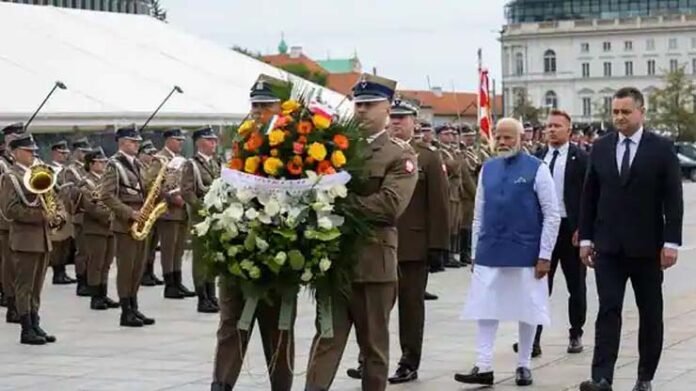Prime Minister Narendra Modi’s three-day visit to Poland and Ukraine was a monumental step in the foreign policy lexicon of our country. India’s foreign policy in the post-Independence period was marked by a deep distrust in terms of ties with the West, particularly with the West European countries because of the painful history of imperialism and colonialism that India had to go through for close to four centuries. Despite opening up ties with the West, especially following the collapse of the Soviet Union and the termination of communist regimes in the East and Central European countries, India continued to see its ties with Europe in a monochromatic frame.
The jolt to such an old and outdated policy commenced during Prime Minister Manmohan Singh’s tenure who decided to bite the political bullet and sign the 123 or Indo-US civil nuclear agreement. This was a crucial moment in India’s foreign relations with the West when Manmohan Singh’s government signalled that it was time to let go of the old acrimony in ties and the need to diversify the foreign policy basket to counter China, the world’s second-largest economy which was breathing down India’s neck.
The opening was further taken forward during the ongoing tenure of Prime Minister Narendra Modi. It, therefore, becomes necessary to understand the nuances of his visit to these two countries.
and New Delhi hold similar views on crucial issues, especially immigration and culture. Both believe in rejuvenating national culture to combat the menace of wokeism and left-liberal policies.
Widening ties
For most of its foreign policy engagements with the West, especially Europe, India focused on the western part of the continent. However, the current government decided to expand its foreign policy base by shoring up ties with Central and Eastern parts of Europe. Poland is a strategically important country. It has a substantially high population for a European country and has a fast-growing and thriving economy, it forms a bridge for engagement with not just the Eastern and Western parts of Europe but also plays a crucial role in acting as an outlet to Eurasia. Warsaw and New Delhi hold similar views on crucial issues, especially regarding immigration and culture. Both countries believe in conservatism and the rejuvenation of national culture to combat the menace of wokeism and left-liberal policies.
During his visit to Poland, Modi and Donald Tusk signed several pacts and upgraded their ties to strategic partnership. This was an interesting move. The Polish government knows well that there is a high chance of Donald Trump coming back to power in the United States, and he has made it clear that Europe needs to do the heavy lifting when it comes to spending more on defense of the continent under the NATO banner. Hence, the Polish government will certainly need strong partnerships to fall back on with countries in other parts of the world if the American government chooses to make the relationship with them transactional.
India urged Ukraine to sit down with Russia and find a negotiated peace to the ongoing conflict. India also condoled the loss of lives on both sides and urged both countries to seek peace and reconciliation at the earliest.
PM Modi’s visit to Ukraine was unprecedented in Indian foreign policy history. Not only was he the first Indian head of government to visit Ukraine after the establishment of diplomatic ties, but the visit came at a crucial moment – Ukraine’s Independence Day.
Upon being questioned about the ostensible ‘neutrality’ in the Russia-Ukraine conflict, PM Modi made it clear in the presence of the Ukrainian president that India was never neutral in the conflict and was always on the side of peace.
India urged Ukraine to sit down with Russia and find a negotiated peace to the ongoing conflict. India also condoled the loss of lives on both sides and urged both countries to seek peace and reconciliation at the earliest.
Missing points
While the three-day visit was fruitful on substance and optics, there was one crucial missing piece – the China factor. India could have used the opportunity to corner China by doubling down on China indirectly by branding the BRI or Belt & Road Initiative predatory in terms of its conditions and fueling China’s neo-imperialist ambitions, especially the dream of reviving its Middle Kingdom where it positions itself as the centre of the universe, the universe in this context refers to the global political order.
Regarding Ukraine, there wasn’t much room for innovation as the visit was meant to balance Russia with Ukraine by playing the role of a possible mediator should both sides want.
India’s economic prospects will rise substantially if India chooses to deepen ties with Central Europe, which is looking for new and prospective destinations for future investments to wean its dependence on China.
Future Opportunities
There is a lot to focus on to generate new opportunities in ties with European countries. India needs to bolster its relations with Central and Eastern Europe. If India plays a decisive role in signing an agreement between Ukraine and Russia, it will boost India’s image as a peace broker.
Further, India’s economic prospects will rise substantially if India chooses to deepen ties with Central Europe which is looking for new and prospective destinations for future investments to wean their dependence off China. From a strategic point of view, India’s defence industry, which is flourishing, can scout Central and Eastern Europe in expanding defence export base in all sorts of weapons, from clothes to hardware and software defence assets.
The opportunities, hence, are immense.
–The writer is currently working as a Research Associate at Defence Research and Studies (dras.in) and is a columnist. The views expressed are personal and do not necessarily reflect the views of Raksha Anirveda
–The writer is currently working as a Research Associate at Defence Research and Studies (dras.in) and is a columnist. The views expressed are personal and do not necessarily reflect the views of Raksha Anirveda






